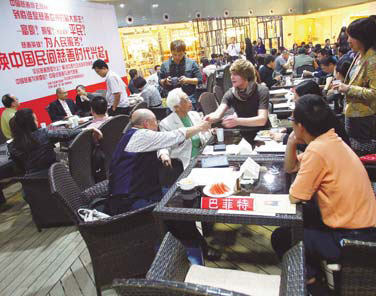China
A charity event for not-so-rich attracts 90 fans of philanthropy
By He Dan (China Daily)
Updated: 2010-09-30 07:47
 |
Large Medium Small |
|
Participants at a grass-roots charity event for the not-so-rich chat at a local hotel in Beijing on Wednesday night. Organizers reserved two seats for US billionaires Warren Buffett and Bill Gates, but they were hosting a charity event for the super-rich in another part of Beijing. [Photo by Zou Hong/China Daily] |
BEIJING - Dozens of not-so-rich people turned up for a civilian charity party that coincided with a charity banquet for the super-rich hosted by US billionaires Bill Gates and Warren Buffett on Wednesday.
About 90 people, including scholars, workers for charitable organizations, students and writers, attended the party for non-billionaires.
Wang Yifei, one of the event's organizers, said many more people had to be turned away.
"I never expected that more than 400 people would respond to my call. I had to turn down some applications since the place we booked could not hold such a big number of people," Wang said.
Wang's invitation to his charitable event was posted on popular Internet forums such as Tianya.
"Even in the United States, nearly 80 percent of charitable revenue comes from citizens' donations," the invitation said.
"Philanthropy should be the poor helping the poor in China and the rest of the world. It should never, ever end up as a fashion show filled up with tycoons, movie stars and celebrities," read the invitation.
Each attendee paid 38 yuan ($5.58) for a buffet at a hall 30 square meters in size at a Holiday Inn Express Hotel in downtown Beijing.
During the two-hour event, people were divided into small groups to discuss their understanding of charity. One representative shared their stories with the larger group.
Buffett and Gates were also on the list of invitations for the party for the not-so-rich, but they did not attend.
"I did not intend to give them a hard choice to make. Rather, I wanted to offer a platform for them to hear what ordinary people think about charity," Wang said.
"Charity is not just about giving money, and it is not just about what the wealthy can do. Anything you give should be called philanthropy," said Oliver Walsh, 19, a native of South Africa and freshman at Beijing Sport University.
His view was echoed by Hu Ming, 77, of Beijing, who offers free calligraphy classes to senior citizens in the Gandong community of Beijing's Haidian district.
"The public is the solid foundation for charity. I came here and urged that philanthropy become a way of life for everyone," Hu told China Daily.
Shi Wenjun, director of the 2010 Spring Festival gala for migrant workers in Beijing, was among the 90 diners.
"I feel the event was a little messy, although participants were eager to share their experiences or stories about charity," Shi said. "But there was a lack of a theme for us to discuss," he added.
For a long time, charitable organizations and foundations have ignored the importance of small donations from the public, Deng Guosheng, an associate professor at the School of Public Policy and Management at Tsinghua University, said at a recent seminar on public philanthropy.
"However, charity needs the public's participation. Therefore, ordinary people other than the super-rich should play a leading role to build a healthy and sustainable environment for philanthropy," Deng said.
"Moreover, charitable organizations will face fewer risks during financial crises if they rely on civilian donations and not just on the rich," Deng added.
China Daily
